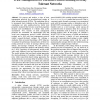Free Online Productivity Tools
i2Speak
i2Symbol
i2OCR
iTex2Img
iWeb2Print
iWeb2Shot
i2Type
iPdf2Split
iPdf2Merge
i2Bopomofo
i2Arabic
i2Style
i2Image
i2PDF
iLatex2Rtf
Sci2ools
GLOBECOM
2010
IEEE
2010
IEEE
Trust Management for Encounter-Based Routing in Delay Tolerant Networks
: We propose and analyze a class of trust management protocols for encounter-based routing in delay tolerant networks (DTNs). The underlying idea is to incorporate trust evaluation in the routing protocol, considering not only quality-of-service (QoS) trust properties (connectivity) but also social trust properties (honesty and unselfishness) to evaluate other nodes encountered. Two versions of trust management protocols are considered: an equal-weight QoS and social trust management protocol (called trust-based routing) and a QoS only trust management protocol (called connectivity-based routing). By utilizing a stochastic Petri net model describing a DTN behavior, we analyze the performance characteristics of these two routing protocols in terms of message delivery ratio, latency, and message overhead. We also perform a comparative performance analysis with epidemic routing for a DTN consisting of heterogeneous mobile nodes with vastly different social and networking behaviors. The re...
Related Content
| Added | 11 Feb 2011 |
| Updated | 11 Feb 2011 |
| Type | Journal |
| Year | 2010 |
| Where | GLOBECOM |
| Authors | Ing-Ray Chen, Fenye Bao, Moonjeong Chang, Jin-Hee Cho |
Comments (0)

